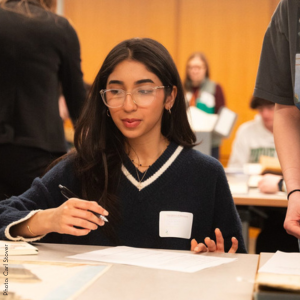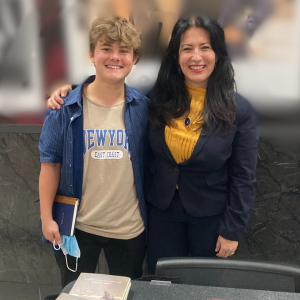Are You Ready?
Academically prepared and motivated juniors and seniors may earn college credits by taking University of Minnesota Twin Cities courses through the College in the Schools (CIS) program. Experience the pace and rigor of U of M courses taught at your own high school.
CIS also offers courses for students in the academic middle or multilingual/ELL students, and considers diverse learning styles, abilities, experiences, and backgrounds.
Is CIS Right for You?
Taking a U of M course through CIS is similar to taking the same course on campus. Your grade will be recorded on an official U of M transcript, and you will earn U of M credit that is recognized by many colleges and universities from coast to coast.
Learn more in this "A Taste of College" article from the College of Liberal Arts.
Ask Yourself These Questions
Are you eligible?
U of M courses offered through CIS have prerequisites, such as grades in related courses, demonstration of particular skills, class rank, and other factors. If you believe you can succeed in a particular course but do not meet the eligibility criteria, discuss this with the CIS teacher or high school counselor.
Do you have enough time to commit to this class?
Consider the other courses you may be taking. Think about nonacademic demands on your time and energy, too, like jobs, sports, music, clubs, family, and friends.
Are you a problem-solver?
One trait of a successful college student is initiative--the ability to seek out and use available resources, to ask questions and get the answers you need.
If these qualities describe you, check the list of schools to see which courses are offered at your school and talk to your counselor about how to register. Courses can fill up quickly, so check in with your counselor soon.
We look forward to working with you!
Tailored to You: Information by Role
Whether you are a student, a faculty member, a high school administrator or counselor, you'll find the CIS information you need here.
Courses
For a list of courses offered by high school, see Partnering High Schools.
Design
Teachers who are interested in offering these courses should view the Instructor Applicant Handbook.
- Creative Problem Solving [Pilot Phase] | DES 1111 | 3 credits
Education
Teachers who are interested in offering these courses should view the Instructor Applicant Handbook.
Exploring the Teaching Profession I | CI 3901 | 2 credits
Exploring the Teaching Profession II | CI 3902 | 2 credits
English and Communications
Teachers who are interested in offering these courses should view the Instructor Applicant Handbook.
Introduction to Public Speaking | COMM 1101 | 3 credits
Introduction to Literature: Poetry, Drama, Narrative | ENGL 1001W | 4 credits
Writing Studio | WRIT 1201 | 4 credits
University Writing | WRIT 1301 | 4 credits
Mathematics
Teachers who are interested in offering these courses should view the Instructor Applicant Handbook.
College Algebra Through Modeling | CI 1806 | 3 credits
Basic and Applied Statistics | EPSY 3264 | 3 credits
CSE Calculus I | MATH 1371 | 4 credits
Science
Teachers who are interested in offering these courses should view the Instructor Applicant Handbook.
Introduction to Animal Science | ANSC 1101 | 4 credits
Human Physiology, Technology, and Medical Devices | BIOL 1015 | 4 credits
Physics by Inquiry | CI 1563 | 4 credits
Introduction to Computing Systems | EE 1301 | 4 credits
Climate Crisis: Implementing Solutions | EE 1701/EE 1703 | 4 credits
Introductory College Physics | PHYS 1101W | 4 credits
Social Sciences
Teachers who are interested in offering these courses should view the Instructor Applicant Handbook.
Introduction to African American Studies | AFRO 1011 | 3 credits
Principles of Microeconomics | APEC 1101 | 4 credits
Principles of Macroeconomics | APEC 1102 | 3 credits
An Interdisciplinary Look at the Family in Multicultural America | FSOS 1211 | 4 credits
Authority and Rebellion: American History to 1865 | HIST 1307 | 3 credits
Global America: US History Since 1865 | HIST 1308 | 3 credits
American Democracy in a Changing World | POL 1001 | 3 credits
Introduction to Psychology | PSY 1001 | 4 credits
World and Classical Languages
Teachers who are interested in offering these courses should view the Instructor Applicant Handbook.
Accelerated Beginning Modern Chinese | CHN 1015 | 5 credits
Beginning Modern Chinese I | CHN 1011 | 5 credits
Beginning Modern Chinese II | CHN 1012 | 5 credits
Accelerated Intermediate Modern Chinese | CHN 3016 | 5 credits
Intermediate Modern Chinese I | CHN 3021 | 5 credits
Intermediate Modern Chinese II | CHN 3022 | 5 credits
Intermediate French I | FREN 1003 | 5 credits
Intermediate French II | FREN 1004 | 5 credits
Intermediate German I | GER 1003 | 5 credits
Intermediate German II | GER 1004 | 5 credits
Beginning Classical Greek I | GRK 1001 | 5 credits
Beginning Classical Greek II | GRK 1002 | 5 credits
Beginning Japanese I | JPN 1011 | 5 credits
Beginning Japanese II | JPN 1012 | 5 credits
Intermediate Latin Prose | LAT 3003 | 4 credits
Intermediate Latin Poetry: Vergil | LAT 3004 | 4 credits
Intermediate Spanish I | SPAN 1003 | 5 credits
Intermediate Spanish II | SPAN 1004 | 5 credits
Accreditation and Evaluation
College in the Schools is accredited by the National Alliance of Concurrent Enrollment Partnerships. The Accreditation and Evaluation web page includes detailed information about accreditation standards and guarantees, as well as program evaluations and research related to dual credit programs, including concurrent enrollment programs like College in the Schools.
Comparing Pre-College Programs
The difference between pre-college options can be confusing, so we regularly update this downloadable chart that compares Minnesota's Concurrent Enrollment programs to Advanced Placement, Postsecondary Enrollment Options, and International Baccalaureate programs.
The chart compares these primary programs on key characteristics, such as the quality of oversight and support provided; how teacher qualifications are determined; how college grades and credit are earned; the transferability of credits; and cost. The data comes comes from a variety of sources, including MDE and research findings.
Staff
Emily Hanson, Program Director | 612-626-8179; hans0996@umn.edu
Jan M. Erickson, Associate Director | 612-624-9898; j-eric1@umn.edu
Koleen Knudson, Administrative Services Coordinator | 612-301-1853; kknudson@umn.edu
Michael Maiorana, Events Assistant | 612-625-1855; cis@umn.edu
Stephanie Davison, Events Lead | 612-625-1855; cis@umn.edu
Molly Olson, Operations Manager | 612-626-1666; olso5550@umn.edu
Phil Dudas, Student Experience, Learning, and Accessibility Manager, University Libraries | 612-626-9105; duda0014@umn.edu
Enrollment Services Staff
Jennifer Koontz, Director of Academic Services, College of Continuing and Professional Studies | cisenroll@umn.edu
Coral Thacker, Registration Specialist, College of Continuing and Professional Studies | mycishelp@umn.edu
Faculty Coordinators and Advisory Board
Faculty Coordinators
CIS Faculty Coordinators select and prepare CIS instructors, provide ongoing discipline-specific professional development and teacher support, and are responsible for the oversight of courses in the high schools. The coordinators ensure that course content, assessment, pedagogy, and grading are the same or comparable to sections of the courses offered on campus. The Faculty Coordinators also serve as liaisons between University departments and CIS. Learn more about individual Faculty Coordinators.
Advisory Board
The CIS Advisory Board comprises CIS partners and stakeholders as well as key members of the Minnesota education community. Their charge is to contribute to the continued vitality and success of College in the Schools. Learn more about the members of the Advisory Board.




